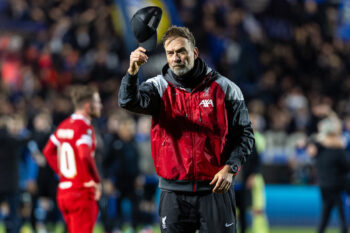Brendan Rodgers showed the first signs of a slight change of approach in victory over Reading on Saturday. A hint of pragmatism from the manager was significant in helping Liverpool to overcome a turgid second-half performance and secure themselves a much-needed first home league win of the season.

For the first time in his fledgling tenure at Anfield, Rodgers opted for a more conservative approach towards his substitutions and made some tactical adjustments which clearly favoured an effort to see out the victory, in favour of an attempt to add to their narrow one goal advantage. This came after Liverpool had lost their way somewhat in the second-half, having dominating the first period and failed to convert a succession of good chances into goals.
Hardly paramount to abandoning his principles, but the evidence suggests a willingness from the manager to slightly compromise those principles in lieu of the situation and, particularly, the need for results.
Results are Liverpool’s ‘raison d’être’ after a slow start to the season; home wins having become such a rarely encountered commodity in recent times. Having failed to overcome Stoke City in their previous Premier League match, any failure to dispatch of a recently promoted, and limited, Reading team would – whether rightly or wrongly – have begun to test the patience of some.
That necessity for victory was clearly reciprocated on the pitch, as the Reds retreated further towards their own penalty box as the second-half progressed and were restricted to the counter-attack, despite dominating possession for much of the game. Although, that said, Reading rarely threatened Brad Jones’ goalmouth.

Liverpool’s second half performance was certainly not amongst their best of the season. Yet Rodgers was well aware that – on this occasion at least – three points of any description were far more significant than any aesthetics.
If Reading had been able to punish their hosts with an equaliser, following yet more profligacy in front of goal, Liverpool’s meagre points return from the opening fixtures of the season may have begun to take on a much more disconcerting tone. As it conspired, a third home win of 2012, and more so the nature in which it was achieved, may just prove a less obvious catalyst for Liverpool’s season.
The absence of a genuine goalscorer, or number ‘9’, in the first team at Anfield has been well-documented. The Reds have had to put in far more effort for their rewards than they probably should need to.
With a couple of notable exceptions, Liverpool have generally not scored the quantity of goals, which the number of chances they have created and their all round dominance in possession should dictate. Whilst, a tendency to concede has also conspired to make it a far more difficult task to win football matches so far this season.
Rodgers is likely to have identified the defensive aspect of the game as an area were Liverpool can improve. It goes without saying that, if a team can limit the number of goals they are conceding, they will need to score fewer goals themselves to win a game.

We have begun to see improvements in this area recently. Not least two successive clean sheets against Stoke and Reading – the first two in the league this campaign. And, whilst a lack of cutting edge in front of goal has limited the Reds to just 1 goal from those two matches, that defensive solidity will prove a base from which the Reds can take more points and win the games which will move them up the table.
Suso, Raheem Sterling and Andre Wisdom, amongst others, have earned places within the starting XI on merit and will, rightly, continue to have a huge influence over Liverpool’s game this season. However, the fact that these are young professionals, who should not be over-exposed in spite of their obvious talents, can not be overlooked.
The young players within the squad are still learning about what it takes to win games in a league as competitive as the Premier League; something which, on occasions requires more than simply creating chances and scoring goals. That is particularly applicable at Anfield, where the pressure and expectation from the home crowd can act as an inspiration, but equally can prove a hindrance when confidence is low.
Liverpool have hardly been well-accustomed to the art of winning league games at Anfield within the past 18 months. And that applies especially to the young players. To that end, it is perhaps not entirely surprising that Rodgers opted to replace Suso and Sterling with Jose Enrique and Jordan Henderson in the second half against Reading.
The likes of Enrique, Henderson, and even the much-maligned Stewart Downing, have found their places within the starting line-up usurped since the arrival of the new manager. Yet, as experienced pros, they may still have a role to play in certain games. Whether that be in supporting the lesser experienced players, or providing more solidity in the closing stages to see out a victory.
This could take some of the goal burden away from Suarez, Sterling and co; at least until the anticipated striking reinforcements arrive in the January transfer window. After all, we can hardly rely on this Liverpool team to score 3, 4 or 5 goals every week to win a match.
Rodgers is right to stick to his principles, and he will continue to receive plenty of support from the Anfield crowd in doing so. Dogmatism and a strong belief in the system and the style of play which he is trying to impose will be the primary manner in which he will be able achieve any long-term success.
However, more of a balance between the pragmatic and the dogmatic approaches in the short term, may just buy Liverpool’s manager and their youthful squad the additional points as well as the extra time which they require.

















Fan Comments